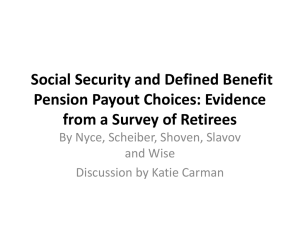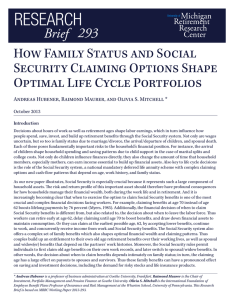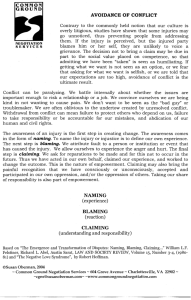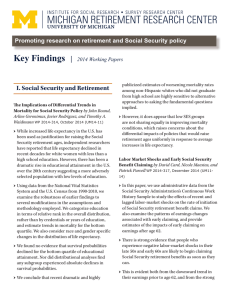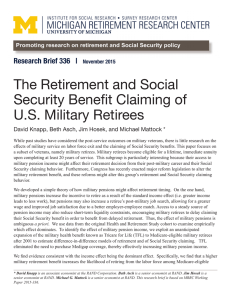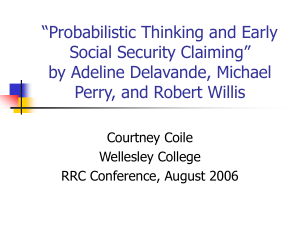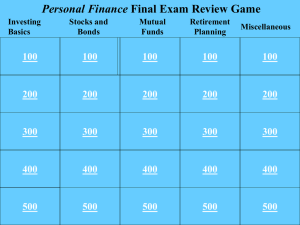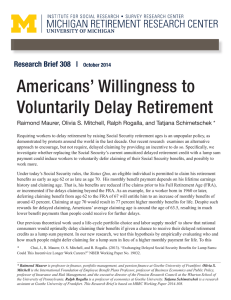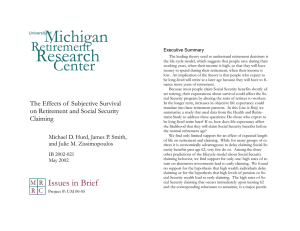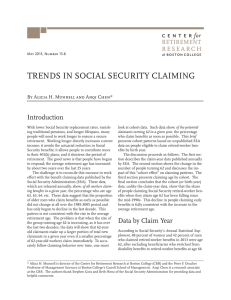Labor-Market Shocks and Early Social Security Benefit Claiming Research Brief 317
advertisement
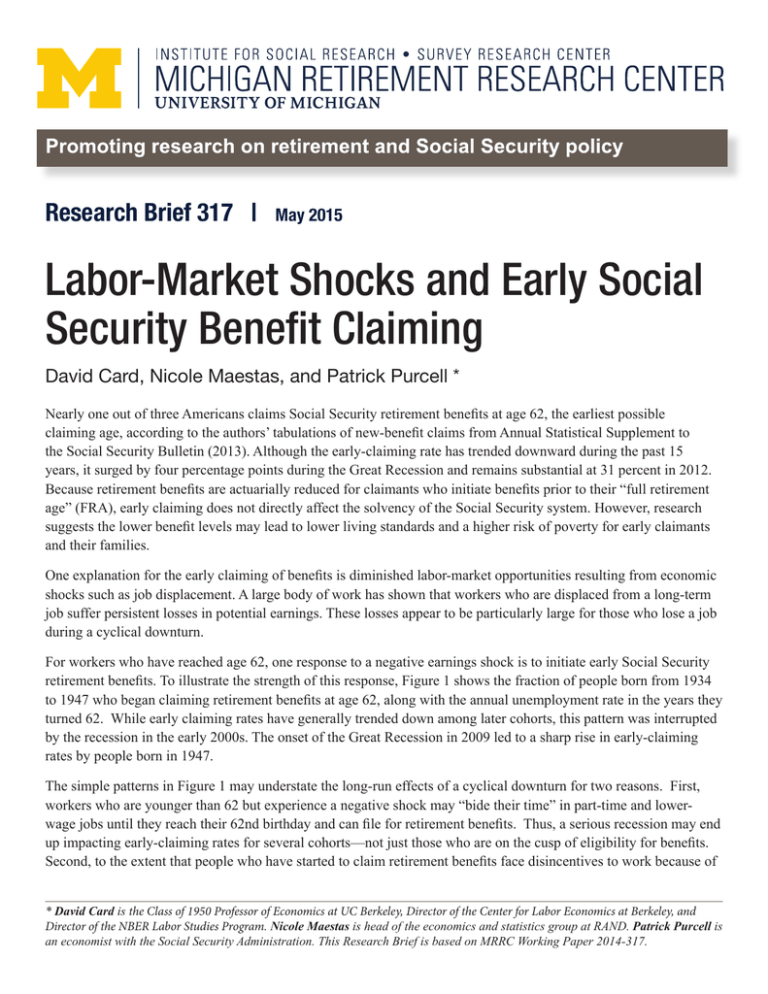
Research Brief 317 | May 2015 Labor-Market Shocks and Early Social Security Benefit Claiming David Card, Nicole Maestas, and Patrick Purcell * Nearly one out of three Americans claims Social Security retirement benefits at age 62, the earliest possible claiming age, according to the authors’ tabulations of new-benefit claims from Annual Statistical Supplement to the Social Security Bulletin (2013). Although the early-claiming rate has trended downward during the past 15 years, it surged by four percentage points during the Great Recession and remains substantial at 31 percent in 2012. Because retirement benefits are actuarially reduced for claimants who initiate benefits prior to their “full retirement age” (FRA), early claiming does not directly affect the solvency of the Social Security system. However, research suggests the lower benefit levels may lead to lower living standards and a higher risk of poverty for early claimants and their families. One explanation for the early claiming of benefits is diminished labor-market opportunities resulting from economic shocks such as job displacement. A large body of work has shown that workers who are displaced from a long-term job suffer persistent losses in potential earnings. These losses appear to be particularly large for those who lose a job during a cyclical downturn. For workers who have reached age 62, one response to a negative earnings shock is to initiate early Social Security retirement benefits. To illustrate the strength of this response, Figure 1 shows the fraction of people born from 1934 to 1947 who began claiming retirement benefits at age 62, along with the annual unemployment rate in the years they turned 62. While early claiming rates have generally trended down among later cohorts, this pattern was interrupted by the recession in the early 2000s. The onset of the Great Recession in 2009 led to a sharp rise in early-claiming rates by people born in 1947. The simple patterns in Figure 1 may understate the long-run effects of a cyclical downturn for two reasons. First, workers who are younger than 62 but experience a negative shock may “bide their time” in part-time and lowerwage jobs until they reach their 62nd birthday and can file for retirement benefits. Thus, a serious recession may end up impacting early-claiming rates for several cohorts—not just those who are on the cusp of eligibility for benefits. Second, to the extent that people who have started to claim retirement benefits face disincentives to work because of * David Card is the Class of 1950 Professor of Economics at UC Berkeley, Director of the Center for Labor Economics at Berkeley, and Director of the NBER Labor Studies Program. Nicole Maestas is head of the economics and statistics group at RAND. Patrick Purcell is an economist with the Social Security Administration. This Research Brief is based on MRRC Working Paper 2014-317. the Social Security Retirement Earnings Test, labor-market shocks that push people into early claiming may lead to lower earnings after age 62, further magnifying the costs of these shocks. In this paper, we use administrative data from the Social Security Administration’s Continuous Work History Sample to study the effects of recent and lagged labor-market shocks on the rate of initiation of Social Security retirement benefit claims. We also examine the patterns of earnings changes associated with early claiming, and provide estimates of the impacts of early claiming on earnings after age 62. We focus on people who were working at age 57 and not already claiming federal disability benefits by that age, following them over the next five to 14 years (depending on their birth cohort). Our analysis points to two main conclusions. First, there is strong evidence that people who experience negative labor-market shocks in their late 50s and early 60s are likely to begin claiming Social Security retirement benefits as soon as they can. This is evident both from the downward trend in their earnings prior to age 62, and from the strong correlation between early claiming and local labor-market shocks experienced between ages 57 and 62. Second, once they begin receiving benefits, early claimers have very low earnings (typically less than $2,500 per year), regardless of how much they were earning in the years prior to claiming. Interestingly, the post-initiation earnings of people who begin claiming benefits at age 62 are not very different from those who begin claiming at ages 63 or 64, while early claimants as a group are substantially different from those who initiate benefits on or after their FRA. University of Michigan Retirement Research Center Institute for Social Research 426 Thompson Street Room 3026 Ann Arbor, MI 48104-2321 Phone: (734) 615-0422 Fax: (734) 615-2180 mrrcumich@umich.edu www.mrrc.isr.umich.edu Sponsor Information: The research reported herein was performed pursuant to a grant from the U.S. Social Security Administration (SSA) through the Michigan Retirement Research Center (MRRC). The findings and conclusions expressed are solely those of the author(s) and do not represent the views of SSA, any agency of the federal government, or the MRRC. Regents of the University of Michigan: Michael J. Behm, Grand Blanc; Mark J. Bernstein, Ann Arbor; Laurence B. Deitch, Bloomfield Hills; Shauna Ryder Diggs, Grosse Pointe; Denise Ilitch, Bingham Farms; Andrea Fischer Newman, Ann Arbor; Andrew C. Richner, Grosse Pointe Park; Katherine E. White, Ann Arbor; Mark S. Schlissel, ex officio
